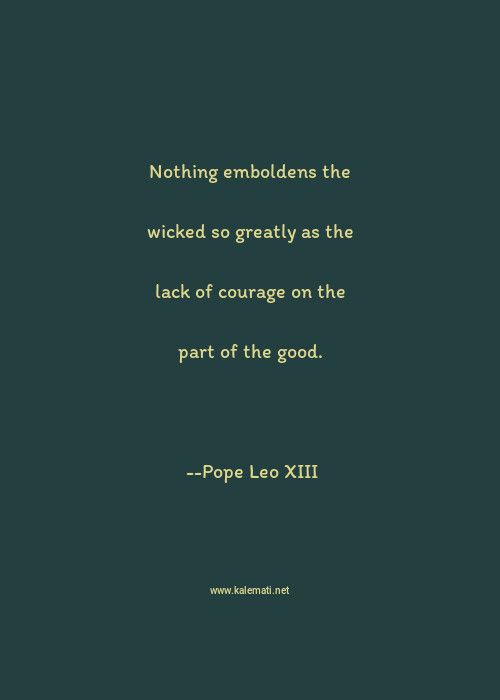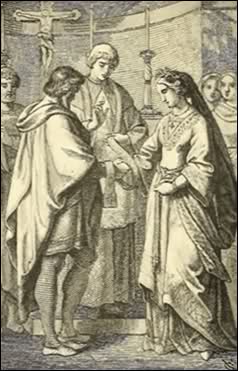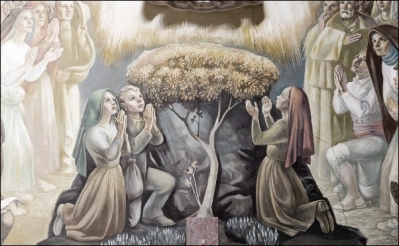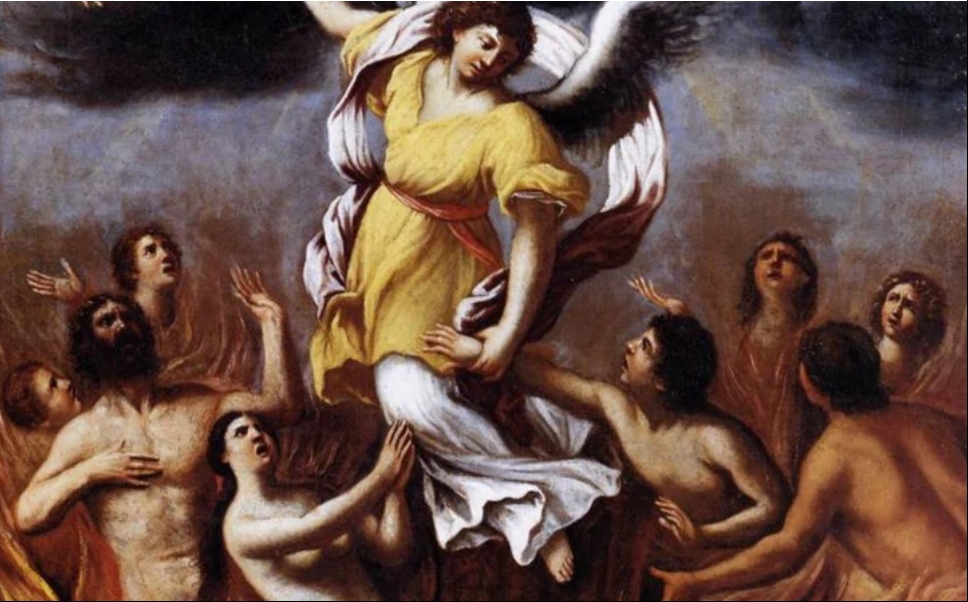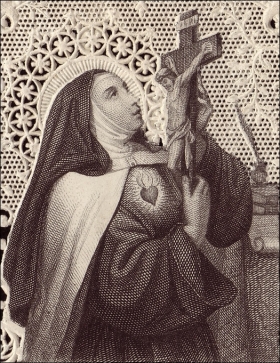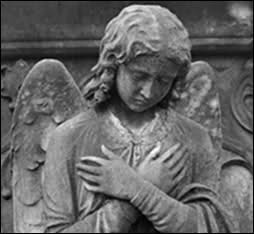Lepanto – Non Nobis Domine
It was in the year 1571. St. Pius V. sat in the chair of St. Peter, and with a gentle firmness ruled the Christian world. The aim of his life as Pope had been to promote peace and harmony among Christian princes and to spread the kingdom of God on earth. He well knew the dangers to which the Church was exposed, and hence, like a faithful shepherd, he kept constant watch lest the wolf should enter the fold. And he had good reason to be on the alert. As he stood in the watch tower of the Vatican, his vigilant eye scanning the horizon, he beheld in alarm and almost dismay a dense cloud appearing. As it drew nearer and nearer it grew in density till it well nigh obscured the light of the sun, and threatened to burst and deluge the earth with another flood.
Selim the Second, the conqueror of the unruly Turks, was in the noon-day splendor of a victorious reign. His onward march had suffered no serious check, and the dead lay strewn in his wake like the wheat that the scythe of the reaper has laid low. And now he turned his haughty eye towards Christendom, and he swore a terrible oath. He swore to subjugate the Christian world —dethrone its Christ and place Mohammed in His stead: “The cross shall fall, and in its place the crescent shall proclaim that Christ is dead and Allah is our God.” Onward he rushed with his Moslem host like a cloud that portends a deadly and destructive storm. The Mediterranean Sea was covered with his fleet. Greece and Hungary had capitulated, and he descended upon the Island of Malta. But his first attempt was defeated by the heroism of the Grand Master of the Knights, La Valette. Enraged at this defeat and mad with the desire of revenge, the Turks attacked the Island of Cypress and sated their fiendish rage in torrents of human blood. A Christian legate was sent to treat with their commander. He was spurned and spat upon and taunted with the words: “Where is now your Christ, and why does He not free you from our hands?” They treated him with a cruelty too barbarous to describe, until death came to his relief. The last words on his dying lips were: “Father forgive them, for they know not what they do” (Lu. xxiii, 24).
And now Pius V. sounded the note of alarm. He called upon the princes of the Christian world to rally round the standard of the cross and fight to save their altars and their homes. But, sad to say, there were but few who volunteered to stem the tide of Moslem invasion and save the Christian world. Only the Venetians and the Spaniards came and joined their forces with the little army of the Pope. Don Juan of Austria was placed in chief command. Prayer and fasting were prescribed throughout the world, and the Sovereign Pontiff himself, like another Moses on the mount, stretched out his arms in fervent supplication that God might lend His aid to those who were battling in a righteous cause.
At sunrise, on the 7th of October, 1571, the Turkish fleet was drawn up in battle array in the form of a crescent, the emblem of Mohammed. They numbered in all 254 galleys and 84 ships of every class. At the sight of this terrible array the commander of the Christian forces raised his standard aloft and displayed a picture of the Redeemer of the world. “Christian soldiers,” he cried out, “you are come to fight the battle of the cross, to conquer or to die. But be the issue victory or death, do your duty well and win a glorious immortality.” Then, falling on their knees, they begged the God of armies to assist them and crown their efforts with success. They closed in on the Turks, and the terrible battle began. For six long hours it raged with fury and with dreadful loss. For a time it looked as though the Turks would win. The left wing of the Christians began to yield; eight galleys of Venetians were sunk, and the right wing was in imminent danger. But suddenly the tide of victory turned. In the very heat of the conflict the two flagships were engaged in a fierce encounter. Twice the Christians were driven back, but in a third attempt, the Turkish commander fell. Ali Pasha was slain and his head raised aloft on a Christian galley. The defeat of the Turks was complete and the power of Mohammed broken. Two hundred and ten Turkish galleys were either captured or sunk. Twenty-five thousand infidels were slain and twelve thousand Christian slaves were freed from the Turkish galleys. The Christians had lost fifteen galleys and eight thousand men.
On the very day of the famous battle Pope Pius was holding a council with his advisers in Rome. Suddenly he rose up, went to the window and gazed intently toward the sky. Then closing the window he turned towards the Cardinals and said: “This is no time to talk of business; let us go and give thanks to God in His temple; our arms have just been blest with victory.” And the Holy Pontiff, shedding tears of joy, fell on his knees in his oratory and poured forth the gratitude of his heart to his good and bountiful Lord. A few days later it was learned that at the very same hour the Christians had defeated the Turks and the cross of Christ had triumphed over the crescent of Mohammed in the Gulf of Lepanto. In gratitude for this signal victory Pope Pius decreed that throughout the Christian world the Feast of the Holy Rosary should be solemnized on the first Sunday of October, and to the litany of the Blessed Virgin he added the invocation: “Help of Christians, pray for us.”
Christian reader, this remarkable incident speaks for itself. It were superfluous to point out the lessons it should teach. But while wreathing the garland of roses for the fair brow of the Mother of God, for this we do when we “tell our beads,” remember that “the arm of God is not shortened”; it is as strong to-day as in the days of long ago, and
When clouds of adversity gather,
And hope to all seeming has fled,
Pray God with more earnest pleading,
He will help you, for so He has said.
Extract From:
THE LOYAL CATHOLIC -SOME TOPICS OF INTEREST
TO THE DEVOTED SONS AND DAUGHTERS
OF HOLY MOTHER CHURCH
By the Rev. Cornelius J. Warren, C SS. R.(1912)
The Stench of Appeasement

“Appeasement is throwing someone else to the crocodiles in the hopes of being eaten last.”
Winston Churchill
Suppose there were a worldwide movement which openly proclaimed its goal of taking over in your country and every country with the purpose of imposing its system on every human being on earth. Also suppose that this movement had carried out murders and terrorist attacks in your own country, that members of this group promoted violence while gaining political influence. Suppose also that is was highly unfashionable and politically incorrect to speak out against them.
I am not speaking of Islam here, but of Communism. The current wave of censorship and denial toward Islam is not a new development. It is rather a very old one. Islamophobia, like Red-Baiting, is a political term that serves the function of cutting off any discussion of the subject. It precludes any listing of the facts or debates on the issue, by declaring it to be off-limits. To raise the issue is to expose yourself as a bad person whose ideas are unacceptable for public distribution.
When George Orwell was struggling to find a publisher for Animal Farm, he was repeatedly turned down on the grounds that the book would offend the Soviet Union. One publisher wrote to Orwell that he had been dissuaded from publishing the book by an important official in the Ministry of Information (an agency that would become the Ministry of Truth in his novel, 1984) who had told him that publishing such a book would be ill-advised at this time. That official was, incidentally, a Soviet spy.
The publisher went on to say that the book might be acceptable if it applied generally to dictators, but not specifically to the USSR. Finally the publisher added, “It would be less offensive if the predominant caste in the fable were not pigs. I think the choice of pigs as the ruling caste will no doubt give offence to many people, and particularly to anyone who is a bit touchy, as undoubtedly the Russians are.”
Change around a few names and this is exactly the rejection letters that courageous books critical of Islam have received. It’s fine to make general criticisms of religious fanaticism, so long as those criticisms are universally applied, and do not offend those touchy people who religious fanaticism occasionally expresses itself in dangerous ways.
In a generally deleted preface to Animal Farm, Orwell wrote, “The sinister fact about literary censorship in England is that it is largely voluntary. Unpopular ideas can be silenced, and inconvenient facts kept dark, without the need for any official ban. Anyone who has lived long in a foreign country will know of instances of sensational items of news — being kept right out of the British press, not because the Government intervened but because of a general tacit agreement that ‘it wouldn’t do’ to mention that particular fact.”
There are quite a few sensational facts and news items that are kept out or minimized in our own media because it would not do to mention them. There are rarely any government officials dictating this censorship, certainly in the United States there are no legal codes that make it mandatory, but this censorship is voluntary. It consists of people censoring themselves, of publications censoring people out of fear of violence, of publishers who feel that this is an ill-advised time to stir up tensions and of a larger body of liberal thinkers who feel that we should sympathize with Islam and ignore any of its violent and supremacist activities.
“At this moment what is demanded by the prevailing orthodoxy is an uncritical admiration of Soviet Russia. Everyone knows this, nearly everyone acts on it. Any serious criticism of the Soviet régime, any disclosure of facts which the Soviet government would prefer to keep hidden, is next door to unprintable,” Orwell wrote in his Animal Farm preface titled, Freedom of the Press.
“Hardly anyone will print an attack on Stalin, but it is quite safe to attack Churchill… throughout five years of war, during two or three of which we were fighting for national survival, countless books, pamphlets and articles advocating a compromise peace have been published without interference… So long as the prestige of the USSR is not involved, the principle of free speech has been reasonably well upheld.”
So too we still have freedom of the speech. We are encouraged to attack our own government, though not the liberal wings of it, but it is still a safer thing to do, so long as the prestige of Islam is not involved. Only when Islam is offended, does the principle of free speech come apart.
It was always safe to attack Bush, but an attack, even on Bin Laden, was considered tacky at best. And an attack on more “moderate” figures, like Tariq Ramadan, was borderline unprintable. While it was ridiculously easy to publish an essay depicting Bush as a war-crazed chimp invading Iraq for oil, Haliburton and Christian fundamentalism, the cultural elites insisted that doing so was an act of great political courage. Meanwhile publishing an essay critical of Islamic figures was next to impossible and dangerously perilous. And those same elites treated it as a despicable abuse of freedom of speech.
The poisonous vein here goes deeper. With the rise of the Bolsheviks there was a vigorous debate over whether or not to recognize the Soviet Union. Two administrations, Wilson and Hoover, chose not to do so. Their reasoning was fairly straightforward and is best expressed in the words of Bainbridge Colby, the Secretary of State under Woodrow Wilson.
Colby was a liberal who had co-founded Roosevelt’s Progressive Party and befriended Mark Twain, nevertheless he laid out a clear rationale for extending no diplomatic recognition to the Bolshevik terrorists. “We cannot recognize, hold official relations with or give friendly reception to the agents of a government which is determined and bound to conspire against our institutions, whose diplomats will be agitators of dangerous revolt, whose spokesmen say they sign agreements with no intention of keeping them.”
That policy persisted under two administrations, including that of President Hoover, who had personal experience with the Soviet Union during the Russian relief effort which bailed out the Communists at a crucial time. It was the FDR Administration which was stuffed full of Communists that abrogated it. FDR became the first American president to directly communicate with a Soviet leader and in his first year of office he invited the Soviet Foreign Minister to Washington D.C. and recognized the Soviet Union.
To achieve that recognition, the Soviet Union pledged not to promote or harbor any groups with the aim of “the overthrow or the preparation for the overthrow of, or bringing about by force of, a change in the political or social order of the whole or any part of the United States, its territories or possessions.” This agreement was never honored in any way, shape or form.
Colby went on defending his policy until his death in 1950 as the right thing to do. And the pace of events only proved him right. The USSR used diplomatic recognition to extract aid, plant saboteurs and conduct espionage. It kept agreements only for so long as they suited it.
The pro-recognition lobby backed of diplomats, businessmen and politicians exploiting argued that only engagement would reform the Soviet Union. That same argument was still being made during the Reagan Administration which was berated for its warmongering obstructionism every time it refused to give in to Soviet demands.
We are back to that same debate today between engaging our enemies or accepting their hostility as a fact. The modern diplomatic corps is full of advocates of engagement with the Muslim Brotherhood, with the Taliban and Al-Qaeda. There isn’t anyone they won’t engage with so long as they hate the United States and seek to destroy it.
Four years of Obama has shown once again that engagement does not work. Not only doesn’t it work, it actually emboldens the enemy and allows the enemy to infiltrate deep within our societies and to corrupt our institutions. That very engagement leads to censorship in the name of friendship. It leads to news articles and books that cannot be printed because they might sabotage the chances for peace.
The hope for peace is the greatest force of censorship there is. Once engagement is passed off as a fairy that you must believe in lest she will die, then censorship becomes absolutely mandatory to keep peace alive. If a book critical of Communism might offend the USSR then it is best not to print it or to water it down. If Muslims riot over cartoons of Mohammed, then it is a civic duty not to print them in the name of peace and understanding.
When we marvel at the Dhimmism in modern cultural life, at the extent to which Islamic viewpoints are presented unchallenged as the establishment devotes its fullest efforts to inveighing against any opposing views, this too has its red precedents.
“The servility with which the greater part of the English intelligentsia have swallowed and repeated Russian propaganda from 1941 onwards would be quite astounding,” Orwell wrote. “On one controversial issue after another the Russian viewpoint has been accepted without examination and then publicised with complete disregard to historical truth or intellectual decency.”
Modern day examples of this surround us on all sides and as a doctor of totalitarianism, Orwell aptly diagnosed the corruption of the elites and their descent into totalitarian expediency.
“If the intellectual liberty which without a doubt has been one of the distinguishing marks of western civilisation means anything at all, it means that everyone shall have the right to say and to print what he believes to be the truth… It is only, or at any rate it is chiefly, the literary and scientific intelligentsia, the very people who ought to be the guardians of liberty, who are beginning to despise it, in theory as well as in practice.
“The word ancient emphasises the fact that intellectual freedom is a deep-rooted tradition without which our characteristic western culture could only doubtfully exist. From that tradition many of our intellectuals arc visibly turning away. They have accepted the principle that a book should be published or suppressed, praised or damned, not on its merits but according to political expediency.”
That principle is now the primary one on the left. This totalitarian cowardice that Orwell inveighed against has been elevated to an unchallenged moral standard. Animal Farm is widely reprinted, but without Orwell’s preface. Like 1984, a book whose composition effectively killed him, it has been treated according to the original plan of that publisher, stripping away most acknowledgements that it is a vicious satire of Soviet Communism, rather than a generic commentary on tyranny.
Orwell’s preface, so rarely published, concludes with his motivation for writing it, “It is the liberals who fear liberty and the intellectuals who want to do dirt on the intellect.”
Islam Overtaking Catholicism in France

Islamic mosques are being built more often in France than Roman Catholic churches, and there now are more practicing Muslims in the country than practicing Catholics.
Nearly 150 new mosques currently are under construction in France, home to the biggest Muslim community in Europe. The mosque-building projects are at various stages of completion, according to Mohammed Moussaoui, the president of the Muslim Council of France (CFCM), who provided the data in an August 2 interview with the French radio station RTL.
The total number of mosques in France has already doubled to more than 2,000 during just the past ten years, according to a research report “Constructing Mosques: The Governance of Islam in France and the Netherlands.” France’s most prominent Muslim leader, Dalil Boubakeur, who is rector of the Grand Mosque of Paris, recently called for the number of mosques in the country to be doubled again – to 4,000 – to meet growing demand.
By contrast, the Roman Catholic Church in France has built only 20 new churches during the past decade, and has formally closed more than 60 churches, many of which are destined to become mosques, according to research conducted by La Croix, a Roman Catholic daily newspaper based in Paris.
Although 64% of the French population (or 41.6 million of France’s 65 million inhabitants) identifies itself as Roman Catholic, only 4.5% (or 1.9 million) of those actually are practicing Catholics, according to the French Institute of Public Opinion (or Ifop, as it is usually called).
By way of comparison, 75% (or 4.5 million) of the estimated 6 million mostly ethnic North African and sub-Saharan Muslims in France identify themselves as “believers” and 41% (or 2.5 million) say they are “practicing” Muslims, according to an in-depth research report on Islam in France published by Ifop on August 1. The report also says that more than 70% of the Muslims in France say they will be observing the Islamic holy month of Ramadan in 2011.
Taken together, the research data provides empirical evidence that Islam is well on its way to overtaking Roman Catholicism as the dominant religion in France.
As their numbers grow, Muslims in France are becoming far more assertive than ever before. A case in point: Muslim groups in France are now asking the Roman Catholic Church for permission to use its empty churches as a way to solve the traffic problems caused by thousands of Muslims who pray in the streets.
In a March 11 communiqué addressed to the Church of France, the National Federation of the Great Mosque of Paris, the Council of Democratic Muslims of France and a Muslim activist group called Collectif Banlieues Respect called on the Catholic Church – in a spirit of inter-religious solidarity, of course – to make its empty churches available to Muslims for Friday prayers, so that Muslims do not have to “pray in the streets” and be “held hostage to politics.”
Every Friday, thousands of Muslims in Paris and other French cities close off streets and sidewalks (and by extension, close down local businesses and trap non-Muslim residents in their homes and offices) to accommodate overflowing crowds for midday prayers. Some mosques have also begun broadcasting sermons and chants of “Allah Akbar” via loudspeakers in the streets.
The weekly spectacles, which have been documented by dozens of videos posted on Youtube.com ( here, here, here, here, here, here, here, here and here), have provoked anger and disbelief. But despite many public complaints, local authorities have declined to intervene because they are afraid of sparking riots.
The issue of illegal street prayers was catapulted to the top of the national political agenda in France in December 2010, when Marine Le Pen, the charismatic new leader of the far-right National Front party, denounced them as an “occupation without tanks or soldiers.”
During a gathering in the east central French city of Lyon on December 10, Le Pen compared Muslims praying in the streets to Nazi occupation. She said: “For those who want to talk a lot about World War II, if it is about occupation, then we could also talk about it [Muslim prayers in the streets], because that is occupation of territory. It is an occupation of sections of the territory, of districts in which religious laws apply. It is an occupation. There are of course no tanks, there are no soldiers but it is nevertheless an occupation and it weighs heavily on local residents.”
Many French voters agree. In fact, the issue of Muslim street prayers – and the broader question of the role of Islam in French society – has become a major issue ahead of the 2012 presidential elections. According to a survey by Ifop for the France-Soir newspaper, nearly 40% of French voters agree with Len Pen’s views that Muslim prayer in the streets resembles an occupation. Another opinion poll published by Le Parisien newspaper shows that voters view Le Pen, who has criss-crossed the country arguing that France has been invaded by Muslims and betrayed by its elite, as the candidate best suited to deal with the growing problem of runaway Muslim immigration.
French President Nicolas Sarkozy, whose popularity was at 25% in July – worse than any predecessor less than a year ahead of a re-election bid, according to the TNS-Sofres polling group – has been spooked by Le Pen’s advance in the opinion polls. He now seems determined not to allow Le Pen to monopolize the issue of Islam in France.
Sarkozy recently called Muslim prayers in the street “unacceptable” and said that the street cannot be allowed to become “an extension of the mosque.” He also warned that the overflow of Muslim faithful on to the streets at prayer time when mosques are packed to capacity risks undermining the French secular tradition separating state and religion.
Interior Minister Claude Guéant on August 8 told Muslims who have been praying on the streets of Paris that they should utilize a disused barracks instead. “Praying in the street is something that is not acceptable,” Guéant said. “It has to stop.”
Meanwhile, France ushered in Ramadan by inaugurating a new mega-mosque for 2,000 worshipers in Strasbourg, where the Muslim population has reached 15%. Construction also continues apace of a new mega-mosque in Marseille, France’s second-largest city where the Muslim population has reached 25% (or 250,000). The Grand Mosque – which at more than 8,300 square meters (92,000 square feet) will accommodate up to 7,000 worshippers in a vast prayer hall – is designed to be the biggest and most potent symbol of Islam’s place in modern France.
Boubakeur, of the Grande Mosque of Paris, says the construction of even more mosques – paid for by French taxpayers – would ease the “pressure, frustration and the sense of injustice” felt by many French Muslims. “Open a mosque and you close a prison,” says Boubakeur.
But Turkish Prime Minister Recep Tayyip Erdogan has implied that the construction of mosques and minarets actually is part of a strategy for the Islamization of Europe. Publicly repeating the words of a 1912 poem written by the Turkish nationalist poet Ziya Gökalp, Erdogan said: “The mosques are our barracks, the domes our helmets, the minarets our bayonets and the faithful our soldiers.”
Reflecting on the retreat of Catholicism and the rise of Islam in France, Archbishop Giuseppe Bernardini, an Italian Franciscan who heads the Izmir archdiocese in Turkey, and who has lived in the Islamic world for more than 40 years, has recounted a conversation he once had with a Muslim leader, who told him: “Thanks to your democratic laws, we will invade you. Thanks to our religious laws, we will dominate you.”

St. Joan of Arc, Pray for Us
http://www.hudson-ny.org/2355/france-islam-overtaking-catholicism
Europe: The Parasite and the Host

Nature never ceases to amaze by its endless inventiveness. Take, for instance, the Mammoth wasp (Megascolia maculate), the largest European solitary wasp. Its method of perpetuating its species is sure to freeze the blood in the veins of any impressionable person. The female of the species searches for the larva of a dung beetle or rhinoceros beetle. Once the prey is spotted, the wasp paralyzes it with one venomous sting and then lays her egg on its outer skin. On hatching, the larva of the Mammoth wasp equipped with sharp hook-like jaws bites through the helpless host’s integument and proceeds to munch away on its soft tissues in a rigorously defined sequence, starting with the least vital organs, such as muscle, blood or fat, and leaving the crucial nervous system for dessert. By extending the life of the host as long as possible, the predator ensures for itself a supply of “live canned food” which stays fresh till the very end.
It’s a matter of conjecture how versed in biology were the leaders of militant Islam, but the plan of conquering the West they concocted a few decades ago mimicked very closely the Mammoth wasp’s strategy: to invade the prosperous North; entrench themselves among the indigenous population blissfully blind to the real intentions of their guests; paralyze its will to resist with the poison of political correctness and multiculturalism; and gnaw at the innards of the host societies, multiplying and feeding on their hosts until gaining total control of Europe.
According to the great Islamic scholar Bat Ye’or, the roots of the problem go back to an association called the Euro-Arab Dialogue created in July 1974 in Paris. The grand objective of the scheme was to meet the acute demand for cheap labor in the European Union countries whose pampered, sybaritic population would not touch dirty jobs with a ten-foot pole, while also creating a counterweight to the hated American monolith, and securing guaranteed oil supplies from the Middle East.
Hundreds of thousands of poor, unskilled immigrants from North Africa, Middle East and Asia, their multitudinous extended families in tow, flooded EC countries. Of course, the invaders had no inkling of the ultimate objectives of the project; they were just seeking economic opportunity. But throughout history the masses have never been consulted by their leaders who viewed the foot soldiers as so much cannon fodder. Assimilation of the newcomers American style was not on the agenda; it was assumed that the immigrants would live in isolated enclaves, out of sight and out of mind of the locals. For some unfathomable reason the European elites believed that all those Arabs, Turks, Kurds and Pakistanis would form a permanent proletarian class forever content with its lowly status. Such naiveté was all the more striking given that the Islamist leaders were in no way reticent about their true goals. Thus, in 1974, speaking at the UN, the paramount Algerian leader, Houari Boumedienne declared for the entire world to hear:
“One day, millions of men will leave the Southern Hemisphere to go to the Northern Hemisphere. And they will not go there as friends. Because they will go there to conquer it. And they will conquer it with their sons. The wombs of our women will give us victory.”
How’s that for lack of ambiguity? That Boumedienne’s thunderous proclamation was ignored just goes to show the power of wishful thinking on the part of the self-deluded Westerners.
But while their hosts were muddled in their thinking, the Muslim leaders were anything but. They saw the gates of Europe thrown wide open before them as a long-awaited chance to turn the tables on the infidels, cherished by the Moslems ever since their expansion had been stopped cold at the walls of Vienna in 1683. Ever since, the West had lorded it over the world of Islam mired in backwardness and seething in impotent fury. But then the day came when the Western civilization, weakened by two terrible world wars, lost its nerve and gave the forces of Islam an opportunity to enter the enemy fortress and conquer it from within without a shot.
The principal cities of Western Europe sprouted Moslem colonies led by radical imams supplied in a steady stream by the Saudi and Pakistani madrassas. The immigrant enclaves isolated themselves from the host societies, acquiring all the trappings of independent quasi-states. They came to be dominated by the fundamentalist mores and customs; Sharia courts sprang up; Moslem leaders gradually trained the authorities to treat the virtual autonomy of their immigrant subjects as an unavoidable fact of life. Generational change failed to housebreak the Moslem, as naïve Western politicians and intellectual had hoped. On the contrary, each subsequent generation of Moslems turned more and more radical; drifted father and father away from their “infidel” neighbors; and increasingly viewed their native countries as conquered lands at the mercy of the triumphant victors.
A typical example is Albaicin, the historical quarter of the Spanish city of Granada. The Moslems who have settled down there are convinced that since they have seized control of Albaicin, they will be able to seize control of the whole city and in time of the entire El Andalus, the crown jewel of the Medieval Caliphate. Here is how the late Oriana Fallaci, a famous Italian journalist and an intrepid and passionate defender of the European civilization, described their tactic in her book “The Force of Reason”:
“In Granada they created a situation similar to the one which at the time was engulfing Beirut and which now is engulfing so many cities of France, Britain, Germany, Italy, Holland, Sweden, Denmark, etcetera. Ergo, today the quarter of Albaicin is in every sense a State within a State. An Islamic feud, an apostatic domain, which lives with its own laws. Its own institutions, its own hospital, its own cemeteries. Its own abattoir, its own newspaper: La Hora del Islam. Its own publishers, its own libraries, its own schools. Schools that exclusively teach how to memorize the Koran. And its own shops, of course. Its own markets, its own banks. Even its own currency, given that in Albaicin all is bought and sold with the gold and silver coins struck on the model of the dirham in use at the time of Boabdil Lord of old Granada. (Money coined in Calle San Gregorio that for the usual reasons of «public order» the Spanish Ministry of Finance pretends to know nothing about).”
The Islamist colonizers relentlessly strengthen their positions, playing on the Western society’s feeling of guilt assiduously fanned by the progressive media. Using salami tactics, the Moslems demand and receive special treatment. Swimming pools in London accommodate Muslim sensibilities in bathing attire. Schools serve halal food. Prison guards have been forbidden to wear St. George’s Cross because it supposedly offends Muslims prisoners sensitive about the Crusades. Muslims have flatly called for Sharia or Islamic law in Britain. The Archbishop of Canterbury has said some form of Sharia law there is “unavoidable.”
This internal expansion proceeds practically unopposed. The Islamists brook no criticism and, eagerly aided and abetted by the politically correct indigenous elites, effectively gag the few brave Cassandras warning of the creeping danger. Their favorite tactic is to assume the pose of victimhood and stridently complain of discrimination — the dreaded, all-purpose accusation which they wield as a burglar his jimmy. No sooner does yet another in a long series of Islamic terrorist attacks occurs than Moslem organizations in the West raise hue and cry about the growing danger of “Islamophobia” and the media darkly warn against an “overreaction.” Major Nidal, screaming “Allah Akbar”, shoots up Fort Hood, killing 13, and the Army Chief of Staff reacts by expressing alarm about how the attack might affect his diversity program.
To add insult to injury, a large proportion of Moslems and almost all their leaders parasitize on the societies they openly despise. In their eyes, to exploit one’s victim, to live off its largess is yet another privilege of the conqueror. According to tradition, Genghis Khan said:
“The greatest joy a man can know is to conquer his enemies and drive them before him, to ride their horses and take away their possessions, to see the faces of those who were dear to them bedewed with tears, and to clasp their wives and daughters in his arms!”
How wonderful it is to revel in the knowledge of one’s power and impunity, how sweet to watch the humiliation of the helpless enemy!
While feeding on the host, the parasite is relentlessly driving for supremacy in Western Europe. The Moslem communities are rapidly multiplying through a high birth rate and a constant inflow of new immigrants. They are highly motivated by vicious envy and all-consuming hatred fed by religious zeal, while the indolent, listless Europeans, having lost their will to live, are sliding ever closer to the edge of the abyss.
As the demographic weight of the Moslem communities in Europe increases, so does their political influence. And pretty soon the time will come for the finale of the drama. The parasite will attack the nervous system of the host — its political institutions. The agony will not last long. The Green Banner of the Prophet will be hoisted over Europe and a new caliphate will rise on its ruins. The great civilization, that has given the world Shakespeare and Goethe, Beethoven and Mozart, Leonardo and Rembrandt, Newton and Einstein, will be no more.
http://www.americanthinker.com/2011/03/europe_the_parasite_and_the_ho.html





